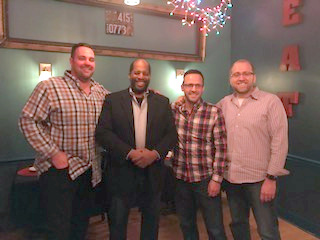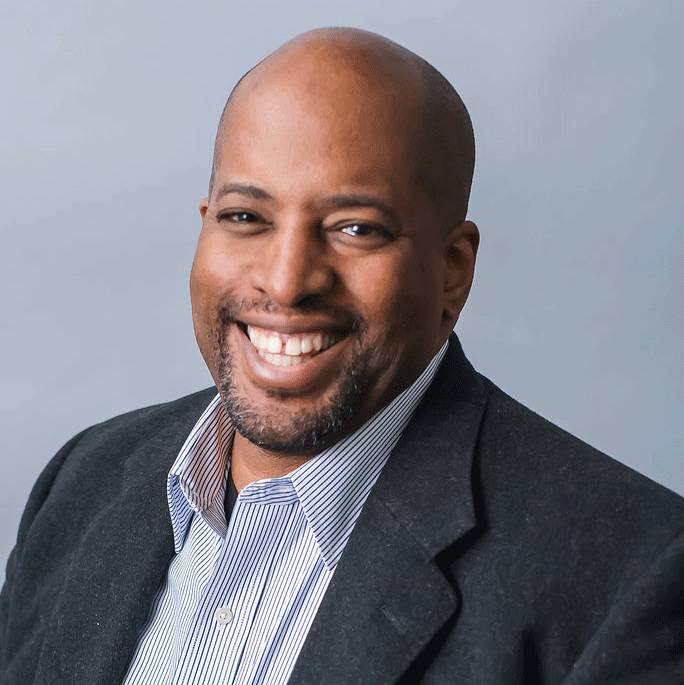
MANCHESTER, NH – There’s a bit of magic in Brian Brady’s success story – after six years with Dyn in sales and marketing he exited last March, from his post as Director of Business Development, for smaller pastures.
And Brady found them at Forcivity, marking the return to his sweet spot: Figuring out the secret sauce of startup success.

He was recently tapped to join tech-startup Forcivity as Vice President of Sales, rounding out a small but mighty leadership team which also includes CEO Steve Baines, COO Maxwell Lydstone and CTO Ben Yaris.
Last week they made a triumphant and momentous move, from Baines’ garage-turned-office space, to new digs in Nashua Technology Park, a perk of being runner-up in the annual John Flatley Challenge, which assists the most promising tech startups of the year.
Bringing Brady into the mix bodes well for Forcivity, given his track record for having the vision to forge pivotal pathways at just the right place and time.
Twenty years ago Brady was an eager graduate of New Hampshire College – later to become SNHU. With a marketing degree in hand and a lifelong interest in technology, he figured he’d pursue his dream of advertising marketing – more cut from the big-idea cloth of Darren Stevens (Bewitched) than the slick-suited Don Draper (Madmen), he says.
“I thought I’d be this advertising creative genius who, on the side, worked on film – I always had interest in that industry, along with advertising,” says Brady. “Technology was more of a hobby.”
And in that way, timing has been everything. At 48, his technophile tendencies made him an early adopter of PCs, and he loved tinkering under the hood. But he also admits to being “a business fan-kid,” absorbing everything from the Wall Street Journal to entertainment trade magazines.
“I’ve always had great interest in understanding how big business worked, and I guess that recipe cooked up my eventual career path. When the Internet emerged in ‘94 or ‘95 my inroad into that industry was to say that I was an ‘Internet expert’ at a time when there were very few people who could say that. I figured with that on my resume, an ad agency would hire me and I’d work my way up,” says Brady. “But nobody was hiring experts at that time.”

So instead, Brady found a door of opportunity into the tech world, selling Internet access for a small company in Bedford, Mass., which would go on to become one of the Top 10 dial-up providers in the country. When cable companies recognized the value of the Internet and started providing broadband service, that door closed. But that was OK – Brady was already following the trend, and worked for a few software and Internet companies, including a stint at Comcast.
Then came Dyn – Brady was one of the first members of the sales team hired, and over the next six years not only did he help scale Dyn from $6 million in annual revenue in 2009 to nearly $100 million in annual revenue in 2016, he actually became that tech-savvy “Internet expert” he tried to market himself as an ambitious college graduate.
Truly a self-actualizing moment that underscores the inspirational mantra of William Arthur Ward: “If you can imagine it, you can achieve it. If you can dream it, you can become it.”
“When I think about what I did at Dyn and the Dyn-specific operation around DNS services, and what they brought to world, I realize now that I became the very thing I said I was back in the ‘90s,” says Brady. “It took 20 years for it to happen, and part of that is having this sort of thirst for knowledge, a particular curiosity in about four or five things that I began unfolding and unwrapping and expanding on.”
Beyond that, Brady says it has been his willingness to take risks and then adapt himself to his surroundings that have made all the difference in his own journey – and what attracted him to Forcivity
“I’ve always thought strategically and considered the long view. I got involved in some right companies and made some right choices. It’s about collaboration. A company like Dyn isn’t successful due to the results of one individual,” says Brady.
“You have company leaders, like Steve Jobs or Bill Gates, who stand out. But the success of their companies comes from a collaborative effort and multiple decisions over multiple days. Bill Gates didn’t set out to be the richest man in the world. He set out to create something that was right for the market at that point in time. It was about the journey. And that’s where I see Forcivity,” says Brady.

Success for tech startups go far beyond having a great idea; in these times a tech company needs to solve a specific problem, and it has to have the right ingredients to prove results. In simplest terms, Forcivity has a solution to the current problem of data overload.
“Every day we’re collecting exponentially bigger sizes of data in the cloud, so it’s this unwieldy thing out there,” says Brady. “The problem we solve is we want to be able to give people a strong and effective way to address that data and pull intelligence out of data in an efficient way.”
Although the cloud is giving people the opportunity to have a low-cost, efficient way to run a business, it comes with unique challenges, he says.
“One of the biggest challenges is accessing and managing that data. What Forcivity does is give companies access to data in a simple and powerful way, so they can basically run reports and business intel against that data, and have a great understanding of how to make decisions for the success of their business going forward,” says Brady.

In that way, Forcivity harnesses the perfect storm of mobile, social, cloud, and big data innovation as the market evolves, becoming a System of Engagement (SoE) for what are known as Systems of Record (SoR) companies, like Salesforce for example.
Leaving Dyn was bittersweet, says Brady. But when Dyn started to scale rapidly – which resulted in its acquisition in 2016 by Oracle – Brady realized it was time to go back to the future.
“As Dyn was transitioning from a startup to a grown-up business, I started to look for other options in the startup world that would be a good fit,” says Brady.
He relied on the formula that had already served him well.
When he landed at Dyn it was the result of a tangible three-point checklist – he wanted to work for a tech startup that was Internet based, where he could focus on a global sales and marketing strategy, and one that was located in New Hampshire.
“That’s what I found in Dyn, and so I ran the same experiment when I was ready to move on. I looked at a number of different options and settled on Forcivity,” says Brady. “They are a good fit. Their growth potential is extremely strong and I’m happy to be part of the early stage of development. It’s the most exciting and fun part of any business, and I want to see it through.”
Along the way Brady has developed a personal philosophy that is borderline zen: You can’t get too excited when things go right, or wrong.

For that reason, he remains grounded, always with an eye on the future and a commitment to the journey.
It’s part of what helps him stay focused as half of a two-career power couple – his wife, Dr. Loretta Brady, is a psychologist who teaches at Saint Anselm College and runs a consulting business, BDS Insight. Together they wrangle a busy brood of five, ranging in age from 11 to 5.
“You’re going to have ups and downs. Raising a family I think about these things, not just in my life or delivering these things to my five children, but I think about my father and mother and stories they told about my grandparents,” he says.
“As an African-American, I trace my ancestry back to my father’s grandmother who was born a slave, so my grandparents worked to sustain their life. My grandfather on my mother’s side was a sustenance farmer who did side work to try to be able to keep the family going. It just so happened that both my parents were able to immigrate from the Caribbean, and eventually meet in New York,” says Brady.
“So I’m just a chapter in a long book, and I want to make sure the real success comes in three or four generations from now – where people who may not know my name are successful in their life as a result of things I’ve done in my life, and the work I did. Knowing I might have great-grand-kids who accomplish things I could never imagine, leaving a legacy like that – that would make me happy.”







